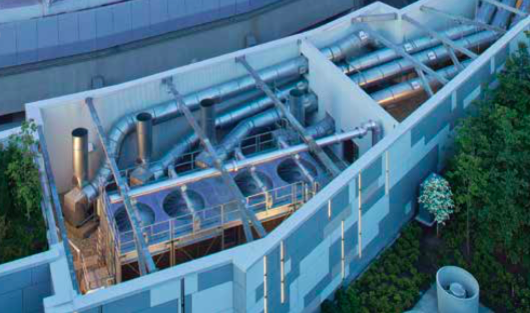
Project: PARQ Resort & Casino
Location: Vancouver, BC
Architect: IBI Architects
Mechanical Engineer: Integral Group General Contractor: Ellis Don Mechanical Contractor: Pitt Meadows / Boradway Joint Venture Sheet Metal Contractor: Apollo Sheet Metal
“In total, Apollo manufactured, delivered, and installed 995,000 pounds of sheet metal for the PARQ project over an 18-month period,” says project manager for Apollo Sheet Metal, Jeremy Hallman. “The flat, square footage of ductwork would fill the floor area of BC Place Stadium just over six times.”
Hallman says the schedule was always top of mind during the project. “Due to structural design, the job was late coming out of the ground, which meant a later start for the mechanical portion of work,” he says. “Revised dates were issued and everyone worked very hard to ensure that these new dates were met. When hotel rooms and functions are booked, there really was no option for failure.”
With five restaurants over six floors, the kitchen exhaust duct was some of the largest that Apollo had ever worked with. The team reached out to SMACNA’s head office in Virginia for clarification to ensure that the ductwork was built to the appropriate spec. The combination of meeting NFPA requirements while ensuring the duct was robust enough to withstand the internal and external pressures placed on it was the main challenge, but no match for Apollo’s experienced crew.
Apollo worked with CADmakers to use their detailing expertise to carefully route the four 1000 to 1250 mm kitchen exhaust runs through the roof steel while maintaining the grades for grease outlined in NFPA-96. This helped point out conflicts long before material arrived on site giving everyone time to find resolutions. The contractor also used water based duct sealers and acoustic duct insulation with high recycled content, which contributed to the project’s eventual LEED Gold certification.
Value engineering played an important role in the project’s development. Early on, Apollo reviewed washroom configurations and was able to combine exhaust runs for the shower and W/C area into a single duct. This helped reduce congestion in the ceiling and the amount of access required for each of the 517 hotel rooms.
A number of specialized products were used on the PARQ Resort and Casino that helped create a more polished finish. All washroom exhaust runs in both hotels were fitted with an Aldes MR modulo valve that automatically regulates airflows in the duct systems.
The passive control element responds to duct pressure and requires no electric or pneumatic sensors or controls. “The MR modulo compensates for changes in duct pressure caused by thermal stack effect, building pressure, dust-clogged filters, and other factors,” says Hallman. “This meant one less access door in every washroom ceiling in the hotel rooms.”
Tablets and Fieldwire software were used on the project to co-ordinate trades, share information, and manage quality control. “With everyone being on the same system the quality of info in and out was second to none,” says Hallman. “The general contractor, Ellis Don, hyperlinked SIs, changes, and shop drawings right onto the individual sheets in the drawing sets, so information was quick and accurate.”
Apollo created QA/QC check sheets for each of the floors with all units listed, and dedicated tradespeople would review progress and note incomplete or deficient work. Fieldwire provided all trades with access to noted issues and backed everything up with photos to help illustrate incomplete or deficient work.
One key challenge on this project was the lack of a lay-down area when bringing material on site—always an issue when working downtown. It was important for Apollo to implement on time delivery, which was a tricky task since the team was sending a 50-foot truck and trailer to site twice a week for nearly a year.
Apollo used pre-fabricated rolling carts for nearly all deliveries to site, which meant materials could be shrink-wrapped in the shop and delivered directly to the work areas. They also fabricated wooden crates with pallets as bases for hotel material deliveries. “We were able to drop the loads on each floor while out-riggers were still set up, but this meant we could break the pallets down to get them out through doors and back to our shop where they could be re-used,” says Hallman. “This allowed us to utilize the crane before the material hoist was extended up to the floor where work was starting for a two- to three-week head start on every floor.”
Another challenge was the RFI and change paperwork. Integral provided an engineer for a full day once per week working out of the same trailers as the mechanical team. “This allowed us to clarify issues and understand design intent, which enabled us to proceed sooner and with fewer hold-ups,” says Hallman. “In my opinion, this collaboration was key to the success of the project.”
The company experienced a major staffing change in May, 2016 just as the project was starting to move into high gear. “We had to move a full-time project manager to site to oversee the work and act as a liaison for the five foremen that we had working on site,” says Hallman. “At our peak we had a 40-person crew working six days per week.”
The job had to be split into manageable pieces of work with individual foreman running each area. Each of the foremen brought unique skills to each of their work areas creating an effective working team.
Hallman says despite the considerable pressure the general contractor was under to keep the project moving forward, a team-focused attitude prevailed on site. “They pushed hard and held everyone to committed dates but were always willing to jump in to help remove roadblocks that would prevent you from being able to do your work,” he says.
One example of this occurred when Apollo was asked to begin installing 12-foot-wide HVAC duct mains before the shoring was removed—the shoring was on 8-foot centres, which means the request was impossible to accommodate. “Ellis Don was quick to provide solutions and remove any excuses,” says Hallman. “A path was cleared and ducts were installed sooner than normally possible.”
Esteban Kello. P.Eng, project manager with Integral Group said calling the PARQ project ‘challenging’ is putting it mildly. Having multiple stakeholders and a variety of program spaces, each with their own specific (and sometimes conflicting) requirements, resulted in a sheet metal design that was complex and immense in scope.
“Taking all of this into account, I can say it was a pleasure to work with Apollo Sheet Metal on the PARQ project,” says Kello. “They were team players, willing to work around the clock to keep the project moving forward on schedule, and open to co-operating with other trades onsite to eliminate delays.”
The fact that the sheet metal on the project ranged in size from as wide as 12 feet to as small as four inches speaks to Apollo Sheet Metal’s adaptability.
“I would recommend Apollo Sheet Metal as the sheet metal trade contractor on any future project,” he says. “I’d also like to personally thank Jeremy Hallman and his team for their hard work in helping this project reach the finish line on schedule.”



